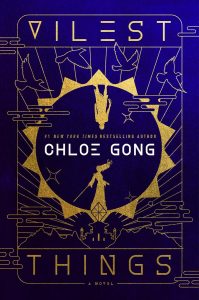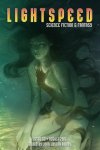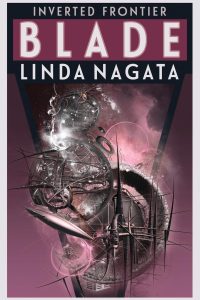Vilest Things by Chloe Gong: Review by Alexandra Pierce
 Vilest Things, Chloe Gong (Saga Press 978-1-66800-026-7, $28.99, 384pp, hc). September 2024. Cover by Will Staehle.
Vilest Things, Chloe Gong (Saga Press 978-1-66800-026-7, $28.99, 384pp, hc). September 2024. Cover by Will Staehle.
Vilest Things picks up about ten minutes before the end of Immortal Longings. This review contains significant spoilers for that first book so interested readers should see my review in the August 2023 issue of Locus.
Vilest Things opens with Anton Makusa having just jumped his qi to crown prince August Shenzhi’s body, over what should have been an impossible distance, in the moment that his lover and rival Calla Tuoleimi stabbed him to win the San-Er games. His first actions are to find out where his birth body is located, and then to ransack the palace records for information about the death of his parents. Only then – as shown in Immortal Longings – is he crowned by Calla, who has just killed the previous king.
The central characters find themselves dealing with great difficulties as their stories continue. Calla thought she had achieved her life’s ambitions at the cost of killing her lover, but now must live with that (actually living) lover despising her for her betrayal; she’s adrift, with nothing left to strive for. Anton, meanwhile, is unexpectedly king, but was betrayed by Calla and learns that his parents were assassinated on orders from the palace. In contrast, Talin as a country should in theory be facing a period of prosperity: Anton should be a much better king than Kasa was. However, two new complications rapidly appear. First, on the political front, there is unrest in the provinces, as well as the suspicious and mysterious deaths of royal guards. Second, on a personal level, Otta Avia – Anton’s first love, in a coma for many years – miraculously wakes up. More problems arise from these: turmoil erupts in the capital San-Er itself, with citizens rebelling against the existing political and (un)religious status quo, which is in turn exacerbated when Otta declares that Talin’s crown – which is supposed to kill the undeserving if they attempt to wear it – is a fake.
The Calla/Anton dynamic was developed well in the first book – they began as adversaries, became wary allies, and eventually lovers. Their relationship has never been an easy one, and their new roles – adviser and king, betrayer and betrayed, with Anton pretending to be someone else – complicate things immensely. Still, Anton as king knows that he needs to work with Calla to deal with the political situation in the provinces; he doesn’t like it, and neither does she, but in theory they could make it work. Adding Otta to the situation, however, changes everything: she has always been reckless and willful – like announcing publicly that the crown is a fake. As adolescents, Anton always followed in her wake. One of the key threads throughout the book is Anton confronting how he has changed during Otta’s absence, and deciding how he will now act. Calla’s main challenge is also personal: Who is she now that she is not looking for revenge?
Throughout Vilest Things, Chloe Gong neatly balances the deeply personal (confronting betrayal, leading a secret life, a resurrected lover) with the intensely political. On the political side, the question of politics and religion is central to events. San-Er and its ruling elite have rejected the old gods, and have tried very hard to stamp out or at least degrade their worship within the capital city. There are efforts to extend that to the provinces as well, although less successfully: Contempt of provincials for their old-fashioned beliefs is de rigueur within the palace. This attempt to control people’s beliefs is a key reason for the discontent felt by many throughout Talin, and it speaks directly to questions of authoritarian control, and the imposition of belief by the elite and powerful onto the masses. Gong also begins to confront questions of what happens after revolution: Calla in particular is wracked by worries about who might seize control in a power vacuum. I expect that much of the third instalment will revolve around this particular issue.
The Flesh and False Gods trilogy was inspired by Shakespeare’s Antony and Cleopatra. Some of the names and roles are obvious nods to the play, and Immortal Longings included clear parallels in a number of its narrative beats. Vilest Things is somewhat further away from that inspiration (not least because Mark Antony never took over Octavian’s body or crown). However, the conclusion that Gong has set up, going into the final book in the trilogy – some sort of showdown between Calla and Anton on one side, and August on the other – harks back once again to the play. I am eagerly anticipating the Shakespearean parallels – but even more, how Gong manages to resolve the personal and the political issues that she has presented so far. I am confident that it will all come together in unexpected, and entirely appropriate ways.
Interested in this title? Your purchase through the links below brings us a small amount of affiliate income and helps us keep doing all the reviews you love to read!
Alexandra Pierce is the editor and publisher of the nonfiction Speculative Insight: A Journal of Space, Magic, and Footnotes. She is an Australian and a feminist, and was a host of the Hugo Award-winning podcast Galactic Suburbia. Alex has edited two award-winning non-fiction anthologies, Letters to Tiptree and Luminescent Threads: Connections to Octavia E. Butler.
This review and more like it in the December 2024 issue of Locus.
 While you are here, please take a moment to support Locus with a one-time or recurring donation. We rely on reader donations to keep the magazine and site going, and would like to keep the site paywall free, but WE NEED YOUR FINANCIAL SUPPORT to continue quality coverage of the science fiction and fantasy field.
While you are here, please take a moment to support Locus with a one-time or recurring donation. We rely on reader donations to keep the magazine and site going, and would like to keep the site paywall free, but WE NEED YOUR FINANCIAL SUPPORT to continue quality coverage of the science fiction and fantasy field.
©Locus Magazine. Copyrighted material may not be republished without permission of LSFF.








